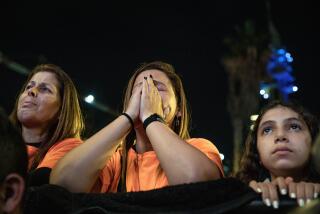Study Finds Geneva Convention Little Known, Seldom Obeyed
- Share via
NUEVA CONCEPCION, El Salvador — Lilian Vilma had suspected for more than a decade that what happened to members of her family was wrong, but she did not know until recently that the abuses they suffered violated an international agreement.
Lilian Vilma, who asked that her last name not be used, was victimized by both sides in El Salvador’s 12-year civil war. First, Marxist guerrillas refused to allow her family to leave the village of Una Seca (Dry Fingernail), even though the hamlet was caught in the cross-fire of battles between rebels and the army.
Then, in early 1988, a group of Salvadoran soldiers requisitioned the truck that her husband used to haul freight and forced him to be their driver.
“He didn’t want to take them, but they were giving the orders,” she recalled recently. “Anyone who did not want to provide them a service could be accused of being a guerrilla and arrested.”
Her husband was caught in an ambush and lost his arm and an eardrum. It took him more than a year to recuperate. The government did not even pay to repair the truck.
Now 34 and a primary school teacher, Lilian Vilma subsequently learned from a Red Cross volunteer that both the rebels and the soldiers had disobeyed a 50-year-old international agreement, the Fourth Geneva Convention, that limits wartime aggression against civilians. She is one of thousands of civilians in a dozen countries who have been directly affected by wars and are being surveyed as part of a study by the International Committee of the Red Cross titled “People on War,” undertaken to commemorate the signing of the accord in Geneva.
The study combines the comments of individuals who had high-profile roles in conflicts; a poll of soldiers, insurgents and civilians; and a survey of a control group. The results made available so far have been troubling, revealing that in many countries, the Geneva Convention is little known, and in countries where it is known, it is seldom observed.
Jaime Arroyo, the Red Cross spokesman in Central America, said of El Salvador: “People did not know that there were rules. Some of the ex-soldiers did know, but [for them] the rules were only on paper.”
Even in Colombia, which has suffered some form of violent conflict during most of the 50 years since the convention was signed, only 37% of the 857 people surveyed had heard of the rules of war. And those who were aware of the convention had little information about its content: Only 56% of them knew that it is unlawful to deprive civilians of food and water as part of combat tactics, the survey found.
While the Fourth Geneva Convention is far better known in Colombia today than it was 20 years ago, the increased awareness has had little effect on the level of violence, said Alvaro Jimenez Millah, a former commander of the M19 guerrillas, who laid down their arms in 1990. Indeed, members of the right-wing anti-guerrilla groups blamed by human rights organizations for most of the massacres in Colombia acknowledged that they have violated the rights of civilians.
The Red Cross found in other countries as well that awareness of the rules of war does not always ensure compliance. In Bosnia-Herzegovina, 80% of the 1,482 interviewees had heard of the Geneva Convention, and 89% of those who were aware understood its meaning. Nevertheless, alarming atrocities were committed during the 1992-95 war in Bosnia.
Even if rules are not respected, they can make a difference in the aftermath of war. For example, because civilians knew their rights in Kosovo, they were better able to document crimes committed there by Yugoslav forces during the conflict earlier this year, making prosecutions more likely.
Yet that is only a side effect of the Geneva Convention. The purpose of increasing awareness of it is to encourage warring sides to obey its rules, said Carolyn Tissot, deputy regional director of the Red Cross in Central America.
The study is one aspect of a broad informational effort that includes discussions with all sides in Colombia’s complex conflict. Besides conducting human rights training for army officers, the Red Cross has made contact with two of the three Marxist rebel factions and with right-wing groups.
In the two years since the Red Cross began human rights training with the armed forces, abuse of civilians by soldiers has dropped considerably, according to human rights groups. Colombian Red Cross officials are hopeful that, by educating other armed groups, they can persuade them to also recognize and respect the international agreement signed half a century ago.
More to Read
Sign up for Essential California
The most important California stories and recommendations in your inbox every morning.
You may occasionally receive promotional content from the Los Angeles Times.













